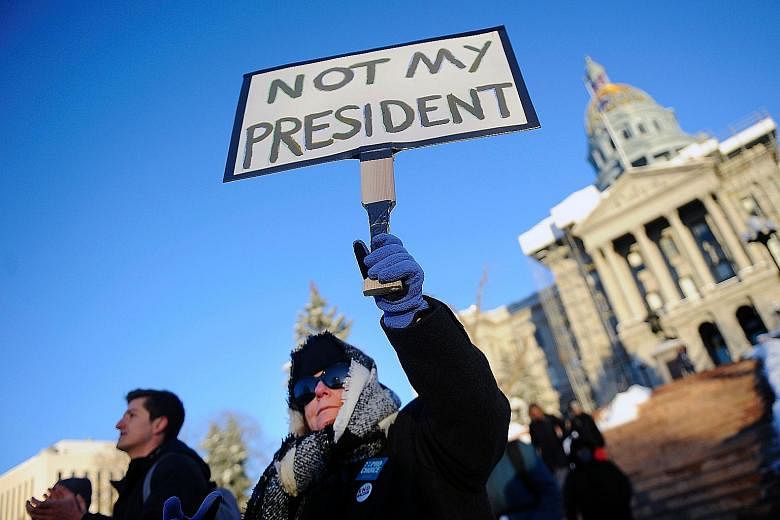WASHINGTON • Many United States Democrats are hoping that yesterday's Electoral College vote to officially select the next president has provided a last barrier to keeping Republican Donald Trump out of the White House.
Their chances of success were slim, when the institution's 538 electors cast their official ballots for president and vice-president at meetings in all 50 states and the District of Columbia.
Learning the outcome will take some time, as states are given several days to report their numbers and Congress will not officially announce the name of the winner until Jan 6 - two weeks before the next president is to be inaugurated.
But the vote - which is usually routine - takes place this year amid allegations of Russian e-mail hacking aimed at influencing the election, as well as Democratic candidate Hillary Clinton's popular vote lead, which now exceeds 2.8 million votes and continues to grow.
When voters went to the polls last month to cast a ballot for president, they were actually choosing a presidential candidate's preferred slate of electors for their state.
A candidate must secure 270 electoral college votes to win. Mr Trump won 306 electors from 30 states.
-
Who are the electors and what is their task?
-
• Electors met in their respective states yesterday to vote for president and vice-president.
• They are 538 people chosen by their state political parties and equal in numbers to each state's number of representatives and senators in Congress, plus three for the District of Columbia.
• Electors can be state party leaders, elected officials, even individuals with a connection to a presidential candidate.
• A "certificate of vote" with each result is mailed or couriered to the National Archives and to Congress.
• Nothing in the Constitution or federal law requires electors to vote a particular way.
• At least one elector has said he will buck his party this year and not vote for Mr Donald Trump.
• Under some state laws, a so-called "faithless elector" may be fined or even replaced.
• On Jan 6, the House and Senate will meet to count the votes. Vice-President Joe Biden, departing president of the Senate, will declare the winner based on who has the majority of votes - at least 270.
• Mr Biden will ask if there are any objections.
• The House and Senate have two hours to decide whether to support an objection. Congress has never sustained an objection to an electoral vote.
• The next step is to swear in the winner on Jan 20.
NYTIMES
However, millions of Americans who consider Mr Trump unfit to occupy the Oval Office have signed an online petition calling for Republican electors to block his election. Thirty-seven of them would have to do so to prevent the real-estate mogul from being elected.
The Republican camp, for its part, has denounced this as a desperate attempt by bitter Democrats unable to accept defeat, and has complained that some electors have been badgered and harassed ahead of yesterday's vote.
The leaked e-mails - linked to Russia by the Central Intelligence Agency - disclosed details of Mrs Clinton's paid speeches to Wall Street, as well as party in-fighting and internal criticism of Mrs Clinton's use of a private server to send e-mails while US Secretary of State.
Mr Trump and his team dismiss intelligence claims of Russian interference, accusing Democrats and their allies of trying to undermine the legitimacy of his election victory.
Ms Kellyanne Conway, senior adviser to Mr Trump, said on Sunday that any concerns about Russia's alleged interference were unfounded.
"Where's the evidence?" she asked.
Mrs Clinton's campaign chairman, Mr John Podesta, said it was an open question whether the Trump campaign colluded with Russia.
A bipartisan group of US senators has called for a special probe of cyber attacks by Russia and other countries. Russian officials have denied all the accusations.
REUTERS, AGENCE FRANCE-PRESSE, NYTIMES, WASHINGTON POST

